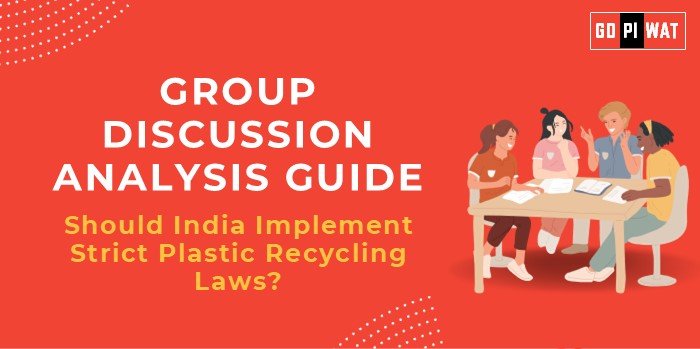📋 GD Analysis Guide: Should India Implement Strict Plastic Recycling Laws?
🌐 Introduction to Plastic Recycling and India’s Environmental Landscape
🔍 Context Setting: With environmental degradation and waste management challenges escalating globally, plastic pollution has become a critical issue. As one of the world’s largest plastic consumers, India’s stance on plastic recycling and management can have substantial environmental implications.
💡 Topic Background: Plastic recycling laws aim to reduce pollution by enforcing stricter guidelines for waste collection, sorting, and processing. The concept, rooted in environmental policy, seeks to mitigate plastic waste impact on oceans, wildlife, and public health. Many countries have seen success with stringent recycling policies, such as Germany’s dual system, offering India a model to consider.
📊 Quick Facts and Key Statistics
- 🌍 Plastic Waste in India: 3.5 million tons annually – Reflects a significant waste challenge.
- ♻️ Recycling Rate: 60% (higher than the global average of 20%) – India has a high recycling rate but lacks robust laws to control plastic use.
- 🚫 Single-Use Plastic Ban: Enforced in July 2022 – Banned production and sale of specific single-use plastics nationwide.
- 🌊 Marine Pollution: India is among the top contributors to ocean plastic pollution – Highlighting the need for urgent action in coastal regions.
🤝 Stakeholders and Their Roles
- 🏛️ Government: Policy formulation, enforcement of recycling laws, and investment in recycling infrastructure.
- 🏢 Industry: Responsible for sustainable packaging solutions, extended producer responsibility (EPR) adherence, and innovations in recyclable packaging.
- 🛍️ Consumers: Key participants in waste segregation, adoption of sustainable practices, and reducing plastic consumption.
- 🌱 Environmental NGOs: Advocacy, awareness campaigns, and community mobilization for recycling and plastic alternatives.
- 🌐 Global Bodies: UN Environment Programme and Ocean Conservancy – Providing guidance, funding, and international support.
🌟 Achievements and Challenges
🏆 Achievements
- ♻️ High Recycling Rate: Despite limited infrastructure, India achieves a 60% recycling rate.
- 📜 EPR Introduction: Major brands now participate in EPR, committing to collect and recycle plastic waste.
- 🚫 Single-Use Plastic Ban: Implemented in 2022, covering products like straws and plastic cutlery.
⚠️ Challenges
- 🔍 Unorganized Recycling Sector: Most recycling is informal, limiting efficiency and safety.
- 🏗️ Infrastructure Gap: Insufficient waste management infrastructure hinders effective recycling.
- 📉 Behavioral Shifts: Consumer adoption of sustainable practices remains inconsistent.
🌍 Global Comparisons
Germany’s stringent plastic recycling laws and South Korea’s recycling success illustrate the positive outcomes of strict regulations, providing a blueprint for India.
📖 Case Studies
- 🌆 Mumbai: Initiated several local bans on plastic bags and achieved notable reductions in plastic waste.
- 🌿 Kerala: Known for grassroots initiatives in plastic collection and recycling through community involvement.
🗣️ Structured Arguments for Discussion
- ✅ Supporting Stance: “Implementing strict plastic recycling laws can help India transition to a circular economy, reduce environmental damage, and foster sustainable growth.”
- ❌ Opposing Stance: “Stricter laws may burden small businesses and increase costs for consumers, especially without adequate infrastructure.”
- 🤔 Balanced Perspective: “While strict recycling laws are necessary, they must be introduced in phases to allow infrastructure development and awareness campaigns.”
💡 Effective Discussion Approaches
- 📊 Opening Approaches:
- 📈 Impact Data: “India produces over 3.5 million tons of plastic waste yearly, with only 60% recycled, highlighting a critical need for stricter policies.”
- 📖 Contrast Approach: “While India recycles more than the global average, the informal sector dominates recycling, suggesting a need for formal regulation.”
- 🌆 Case Study Opening: “Mumbai’s local plastic bans showcase the potential of stricter regulations in reducing plastic waste.”
- 💬 Counter-Argument Handling:
- Example: “While strict laws may affect small businesses, subsidies and incentives can encourage compliance and innovation.”
📋 Strategic Analysis of Strengths and Weaknesses
- 💪 Strengths: High recycling rate, existing EPR policies, public awareness of plastic pollution.
- 🚧 Weaknesses: Infrastructure limitations, high dependency on the informal sector, enforcement challenges.
- 🌱 Opportunities: Employment in formal recycling sector, export potential for recycled products, public-private partnerships in waste management.
- ⚠️ Threats: Economic impact on small businesses, non-compliance risks, resistance from consumers and industries.
🎓 Connecting with B-School Applications
- 🌍 Real-World Applications: Sustainable supply chain projects, waste management optimization in operations, and social enterprise opportunities.
- 📋 Sample Interview Questions:
- “What economic benefits can India gain by implementing strict plastic recycling laws?”
- “How can small businesses adapt to stricter recycling regulations?”
- “What global recycling policies can serve as models for India?”
- 💡 Insights for B-School Students: Understand the economic impact of recycling laws, explore innovation in sustainable products, and consider opportunities in environmental entrepreneurship.


